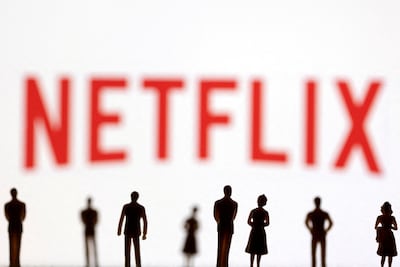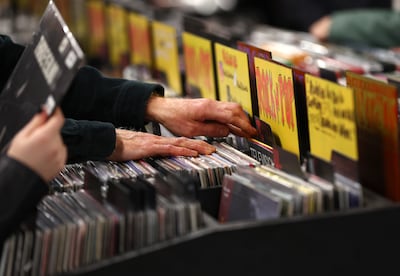At the tail end of 2023, Netflix released a film imagining the horrors of a world without Netflix.
Leave the World Behind by Egyptian-American director Sam Esmail is an apocalyptic story that zooms in on the smaller aspects of life as the world comes to an end.
One thread throughout is a little girl and her tireless attempts to capture Wi-Fi to finish watching the last episode of Friends. Characters around her are concerned with life and death but for her, nothing is more important than a resolution of the Ross and Rachel saga.
To great luck, she finds a solution to her problem: physical media. Within a doomsday vault that houses all the necessities to weather the storm, there's a vast and impressive collection of films and television shows on DVD, including her beloved Friends. As the credits begin to roll, all we can hear is the show's opening theme.

But while Netflix may imply that your old DVDs will only become necessary when society collapses, the truth is, that these collections are once again proving vital.
So, what is the state of media consumption today? And how is streaming affecting other modes of entertainment such as gaming and music? Are we getting more for our money, or are we blinded by the illusion of choice?
Why digital media is coming up short
When the age of streaming began, the promise was an endless catalogue with a lower price, all delivered at the click of a button whenever we needed it. Not only film and TV, but music and gaming too.
However, for film and TV in particular in the age of Netflix, Disney+, OSN, Shahid, Starzplay and Amazon Prime Video, the cost to subscribe to all have surpassed what we previously paid for cable or satellite services, all with shallower libraries than were promised.
For example, we've all had the experience of trying to find a movie and, if it's not a streaming original, it becomes very difficult to find. If a film, either contemporary or classic, does happen to show up on a streaming service, it's often gone months later. Try looking for a film before 2010 and the shelves are threadbare.

You may think purchasing digital media, such as Apple iTunes or Amazon, offers a solution. But even so-called bought digital media only grants you access to it, not ownership of it. If a film is purchased from these services, you can watch it all you like, but if they lose the rights to holding that film, then it’s gone from your library, regardless of what you paid for it.
Licensing issues are only the tip of the iceberg. Traditional studios, which have started streaming services such as HBO Max (now Max) and Disney+, are finding the new system much less lucrative, leading them to delete titles from the service.
Last May, Disney removed 50 films and TV shows from its streaming service, including titles such as Willow and Artemis Fowl. That same month, the then-HBO Max deleted 87 titles, including long-running series Westworld. Some of those shows and movies found new homes, others did not.

In 2022, Warner Bros Discovery, the owners of Max, shelved completed films Batgirl and Scoob! Holiday Haunt, something unthinkable in the previous business model. Previously, these films could have proven lucrative if not theatrically, but with home video purchases.
Streamers have also taken it upon themselves to self-censor past material they deem unfit for the current climate. Disney+ has blocked the Michael Jackson-starring episode of The Simpsons globally, making it now only available on DVD releases. Netflix and Hulu have removed episodes of Community and 30 Rock, leaving them exclusive to physical media as well. Regional streamers are also known to release censored versions of international productions or even not release them at all for myriad reasons.
The availability of these shows and films is then dictated by a company’s decision on whether or not they think it’s profitable to keep them or suit their modus operandi. If you’re a fan of one of these films or shows it's gone for ever, unless you purchase a physical media release.
Music and gaming are not immune to these same forces. Due to licensing deals, music has been removed from digital copies of games such as Grand Theft Auto IV, leaving the original preserved only on physical media.
Artists such as Neil Young and Joni Mitchell have removed their entire catalogues from Spotify in protest of moves the company has made and because of doubts about the sound quality of the music available.

Traditionally, music, movies and games have also enjoyed a huge secondary market, with people able to buy used titles or lend them to their friends when done, a culture which is now made impossible with digital purchases.
The system seems to like it this way. One of last year’s biggest video game releases, Alan Wake 2, can only be purchased digitally, and there’s no news on whether or not a physical release will be made available. The future of gaming seems to be writing out physical media completely.
How to get into physical media
Sadly, just as more and more people come to grips with the shortcomings of the digital and streaming age, physical media is disappearing from public spaces. In the US, the retail chain Best Buy began removing all its physical media stocks for good at the start of the year. In the region, retailers such as Borders have become less bookshops and more stationery or toy stores.
There is hope, however.
In the world of film in particular, boutique Blu-ray labels such as Criterion, Arrow Video, Powerhouse Indicator and Kino Lorber continue to pop up. They not only painstakingly restore films and TV shows, often with the involvement of the original filmmakers, but they also provide a host of extras. It's a lost art since the demise of the DVD to make movies feel less ephemeral as behind-the-scenes and critical features allow viewers to dive deeper into the work at hand.
In the UAE, these mostly will be found online by going to their individual stores and shipping them to the country.
In music, vinyl, cassettes and even CDs continue to provide strong sales, and speciality shops in the UAE are emerging, such as Raw Music Store and The Flip Side, both in Dubai.

For gaming, physical media collection has grown for legacy systems, with old consoles and games from years past continuing to increase in price, making physical media a shrewd investment for gamers, with sites such as the UAE-based Retro Gamer continuing to thrive.
As for the price of building a collection, in comparison to what people now spend across digital media, it's comparable. According to data site Cloudwards, 15 per cent of people in the US pay $50 a month for subscriptions, which amounts to $600 a year. Year on year, that money could be invested in tangible purchases that can be revisited and appreciated.
With streaming services showing no signs of slowing down, 2024 could be the year more people take back control of the media they spend money on and choose to grow collections, instead of sending it to the cloud.

